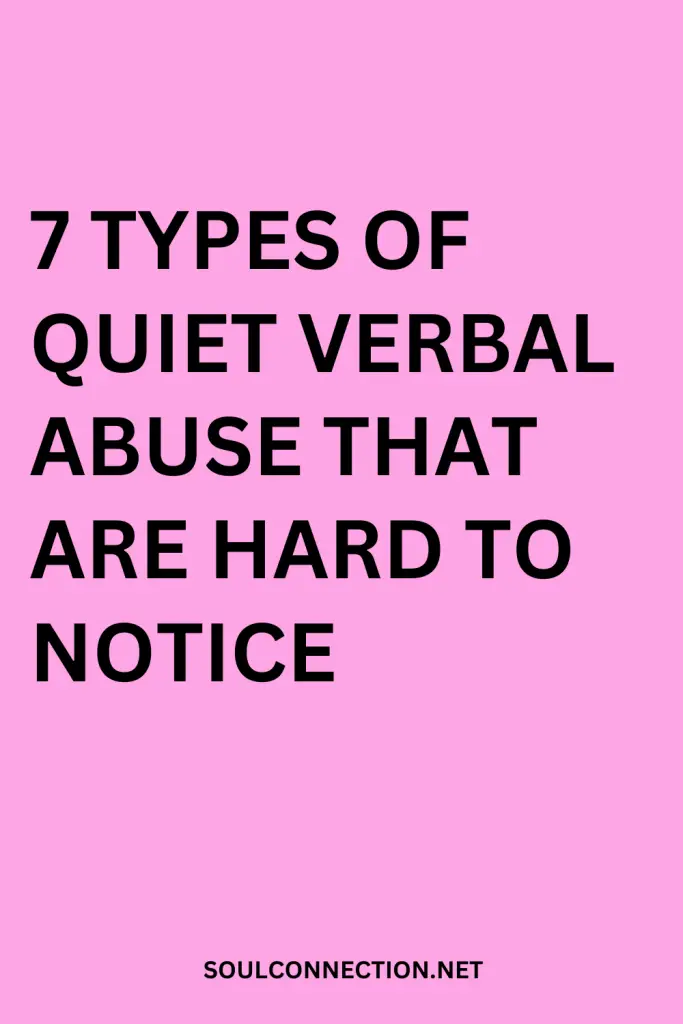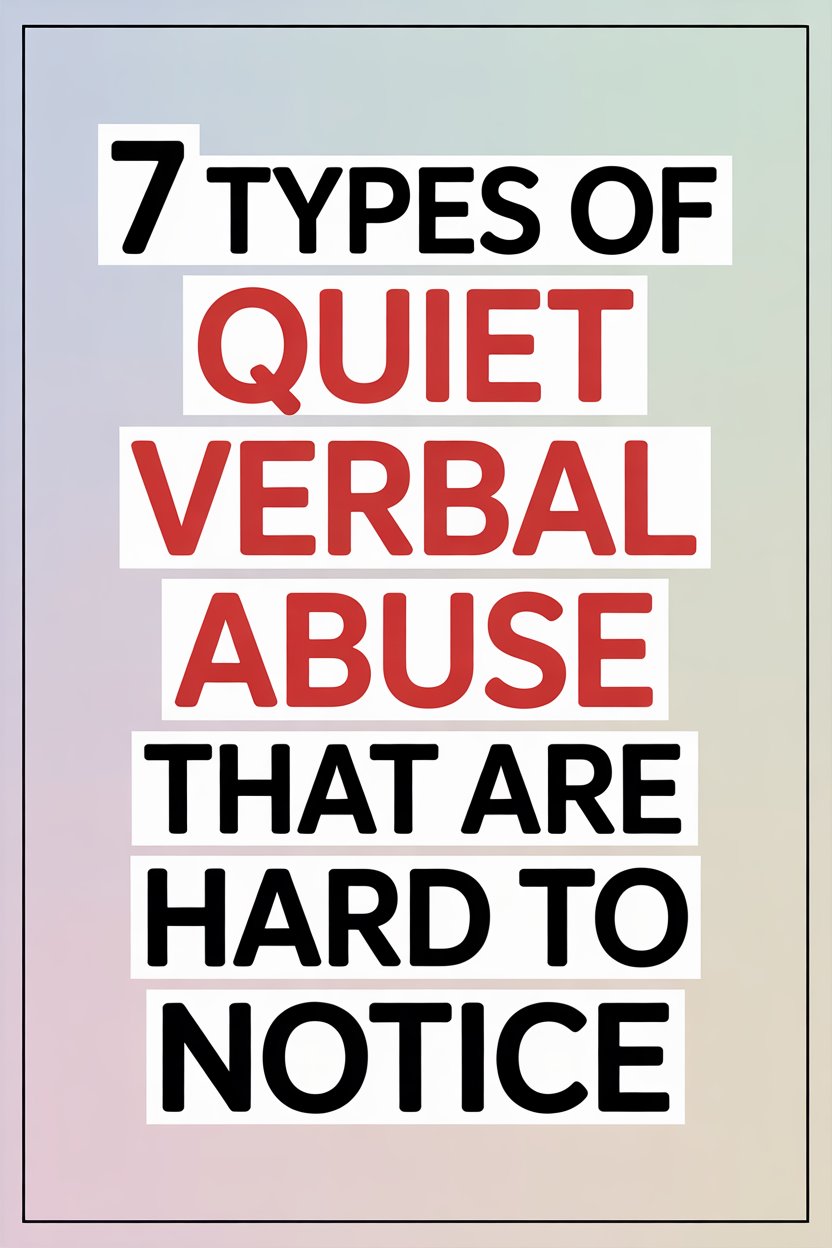Every relationship has its moments—heated debates about laundry, the “where do you want to eat?” standoffs, and maybe a few eye rolls tossed in for good measure.
But not all relationship quirks are harmless. Some are downright poisonous, expertly disguised in whispered comments and subtle jabs.
The sneakiest? Quiet verbal abuse. It rarely shouts. It whispers, drips, and slowly chips away at your self-worth.
Recognizing these soft-spoken assaults is trickier than finding a matching pair of socks in the dryer. Here’s the lowdown on the seven types of quiet verbal abuse that tend to fly under even the most finely tuned radar.
1. Insidious Gaslighting
Here’s the Olympic sport of emotional manipulation: gaslighting. The abuser questions your memory, your reality, and—eventually—your sanity, all with a straight face.
It’s less about wild accusations and more about those sly, “Are you sure you said that?” or “You always get things mixed up.” Over time, you start second-guessing yourself so much you’d swear you’ve developed early-onset amnesia.
If you constantly find yourself apologizing for things you’re sure you never did, or you’re nervously replaying conversations in your head at 2 AM, you might be getting gaslit.
Keep a journal, confide in a friend, or, heck, consult your phone’s call log—anything that helps you stay grounded in your own experience.
2. Passive-Aggressive Sniping
This is classic “I’m not mad” energy, but with enough venom to kill a cactus. Passive-aggressive abusers don’t yell. They let their words drip with sarcasm, roll their eyes, and leave you guessing about what you did wrong.
You’ll get backhanded compliments like, “Nice of you to join us,” or helpful hints such as, “Must be nice to have so much free time,” when you’re just five minutes late (after doing everyone else’s laundry, mind you).
Spotting this one can be tough because it’s easy to write off as someone “just having a rough day.” But when every interaction feels like a minefield, it’s not you—it’s them.
Address these digs directly. “Hey, that comment felt a bit off. Did you mean it that way?” Call out the elephant in the room. It hates attention.
3. The Silent Treatment (The Grown-Up Timeout)
Some folks perfect the art of ignoring better than any angsty teenager.
If your partner routinely goes full mime after disagreements—refusing to talk, withholding affection, or acting as though you’ve suddenly turned invisible—welcome to the silent treatment.
It’s a masterclass in control. Your partner knows you’ll scramble to make peace, apologize for things you’re not sure you did, or tiptoe around the topic for days. This isn’t about cooling off. It’s about freezing you out.
Breaking the cycle means calling it out (gently, if you must). “I notice you’re not speaking to me. I’m open to talking when you’re ready, but I won’t chase you.” Then stick to your word. Emotional blackmail doesn’t thrive when ignored.
4. Subtle Dismissal and Minimizing
Ever opened up about your feelings only to be met with, “You’re overreacting,” or, “It’s not that big a deal”? Welcome to the world of minimization, where your emotions get the “bless your heart” treatment.
Dismissal is as damaging as any insult. Over time, you learn to bottle up your feelings, convinced that voicing them will only earn you an Olympic eye roll.
If this rings a bell, try using “I feel” statements and stand firm. And remind yourself: your feelings are valid, even if someone else doesn’t have the emotional range of a teaspoon.
5. Joking at Your Expense (The Ha-Ha Hurts)
Everyone loves a good laugh. But if your partner’s jokes always come at your expense (“Careful, she’ll burn the toast again!” or “Great, another one of your ‘brilliant’ ideas”), it’s not comedy—it’s cruelty with a laugh track.
These “jokes” often come with the world’s oldest get-out-of-jail card: “Can’t you take a joke?” Well, yes. Just not the kind that chips away at your confidence.
Don’t laugh it off if it stings. A simple, “That wasn’t funny to me,” is enough. If they won’t drop the act, maybe it’s them who needs a new material (and possibly a new audience).
6. Covert Criticism Disguised as ‘Helpfulness’
The abuser wraps their criticism in shiny packaging, calling it “feedback,” “advice,” or “just trying to help.” But somehow, you always end up feeling like a walking failure.
Phrases like, “I wouldn’t have done it that way, but you do you,” or “Are you sure you want to wear that?” set off alarm bells. Helpful? Only if your goal is to feel perpetually inadequate.
True support encourages, not diminishes. If your partner’s “helpfulness” leaves you feeling smaller, it’s time to draw a line.
Try, “I appreciate help, but I’d like to do this my way today.” Or return the favor and offer some unsolicited “helpful” advice of your own—just to see how well it lands.
7. Conditional Kindness
Now we arrive at the masterstroke. Conditional kindness is when affection, praise, or even basic politeness is only available if you’re behaving precisely as wanted.
Did you get everything right today? Congratulations, here’s a crumb of affection. Step out of line? Suddenly, you’re public enemy number one.
Relationships shouldn’t require you to jump through flaming hoops to earn love. This is manipulation, pure and simple.
Unconditional kindness means your partner’s warmth isn’t transactional. If you spot this pattern, talk about it. “I’ve noticed you’re extra nice when things go your way, but when they don’t, it feels very different.
What’s up with that?” Respect isn’t a reward for obedience—it’s a minimum requirement.
What to Do When the Volume Is Low, but the Damage Is High
Quiet verbal abuse is the ninja of relationship toxins—hard to see, easy to excuse, but still capable of wrecking your sense of self.
If you spotted your relationship in any of these patterns, don’t panic—but don’t brush it under the rug either.
Set boundaries. Address the behavior directly (if it’s safe to do so). And, if you need help, rope in a friend, therapist, or anyone who’ll listen without judgment.
Your voice matters—even (or especially) when someone else is trying to silence it. If your partner loves you, they’ll care about your comfort as much as you care about theirs.
And if not? Well, life’s too short to spend it explaining why your feelings matter to someone who’s determined not to hear you.
Remember: love shouldn’t hurt, even in a whisper.


